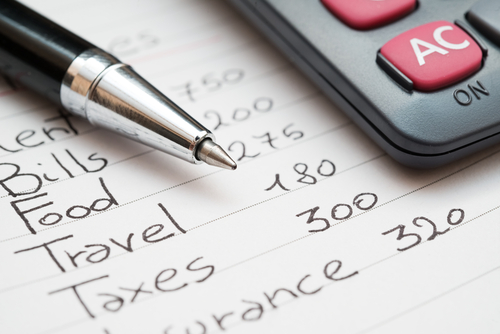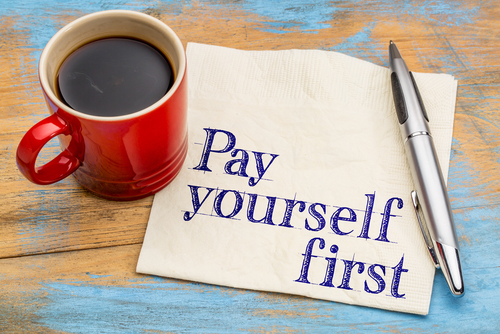Irregular income is becoming more prevalent in the modern workforce. How do you manage your money when you have little idea on exactly how much you’ll be making month to month?
It’s a fiscal challenge freelancers, the self employed and commission based salespeople are very familiar with! Let’s have a look at one of the approaches you can take to master the art of cash flow on an irregular income.
Know your ‘bare bones’ expenses
Getting your head around managing an irregular income starts with knowing exactly what essential ongoing living expenses need to be covered on a monthly, weekly or fortnightly basis. Most of these will be fixed expenses but some will be variable too. This includes –
- Mortgage or rent repayments
- Utilities
- Other loan / credit repayments
- Transport
- Phone / internet
- Groceries

Basically, this is the minimum you need to earn to get by. Now add to the list the amount you plan to save, and invest each month. This might be a percentage or dollar amount. While these amounts may not be essential living expenses, they’re essential wealth building expenses!
If you work for yourself, you’ll also need to set aside tax (Aussies, here’s the ATO guide) and superannuation contributions.
Add discretionary expenses
Now add your expenses that can fluctuate week to week – discretionary spending like entertainment, eating out, hobbies etc. Review old statements and receipts to get a handle on where your spending goes. This exercise is a good chance to look for ways you can trim the fat in your spending habits too.
Now you have a figure for your expenses and spending for each month. You’re going to create a ‘regular paycheck’ to yourself using this information.
Emergency fund
Living financially stress-free on an irregular income is massively dependent on the size of your emergency fund.
Thinking about taking the plunge to start your own business? I can’t stress enough the importance of really building your emergency fund up first before you take the leap – at least 6 months of bare-boned expenses saved.
A well stocked emergency fund is key to making living on a variable income as financially smooth as possible.
Pay yourself a ‘regular paycheck’ on the same day each month or fortnight
Everything earned during the month should be directed into one bank account – your ‘income account’.
On the same day each month or fortnight, transfer your ‘regular paycheck’ amount from your ‘income account’ to a separate debit card account. The amount of this regular paycheck should be your living expenses only.

Your bill amounts, investing and debt allocations will all be transferred to where they need to be from your income account. You want your money where it needs to be when it needs to be there. Stress free, right?
For direct debits scheduled by the provider, get in touch and ask if they can set up your direct debit to be deducted from the relevant account on the day after you transfer your paycheck – this will make things easier to manage.
What remains in your checking account is your discretionary spending for the month / fortnight. It’s a smart idea to divide this amount up into the weekly amounts you have to spend and remember – once it’s gone, it’s gone! This prevents you from ‘overspending’. It’s magic really.
This process does take a little time to iron out if you don’t have enough savings to draw your first ‘regular paycheck’ in the beginning. It may take a few months to build up to and during which time you may find it’s better to manually transfer bills, savings, and investments. Once you’re in the flow, turn on your automated systems.
Irregular Income – Don’t overspend in feast so you have a buffer in famine
Feast and famine months are often the hallmark of an irregular income, especially for freelancers and small business owners. Maybe you totally killed it one month and the dollars have poured into your income account – feast mode! Other months might be MUCH leaner…uh oh, it’s a famine month.
It’s essential that you continue to draw the same regular paycheck when you are in feast mode with a surplus; although it might be tempting to overspend.
Keeping your paycheck the same and living off the same amount of money even if you’ve had a flush month means a surplus is created for those famine months. This surplus, along with your emergency fund, will help you ride out the lean times.

That said, don’t just let a whole bunch of money sit there doing nothing! As the surplus builds to a tidy amount, get it working for you by investing it or paying down debt in a lump sum.
Do you earn an irregular income? How do you manage your finances?

Hi Sharon
Your discretionary spending should come out of the account that you use for day to day living expenses. I suggest this should be an account that is linked to debit cards, which should not be the account where your salary/wage is deposited. If you have an irregular income this still applies, keep the day to day living expenses money separate. Let me know if you want more clarification. Thanks 🙂
Hi Andrew,
When you mention discretionary spending comes out of what is left in the checking account. Does the checking account refer to the original ‘income account’ or the ‘regular paycheck’ account? Please clarify.
Hi Damien
I can appreciate that this can be difficult to follow without a diagram, as I needed one too when I was first working my way through this material. I will organise a diagram to be sent to you tomorrow that hopefully makes it clearer for you.
Andrew
I find this really hard to follow, the lingo goes from ‘income account’ to ‘checking account’ to ‘cheque account’ combined with ‘regular paycheck’ and ‘living expenses’ & ‘debit card’. I need a diagram as the wording confuses me, so I cannot see/follow the logic. It should be simple, sounds simple, but I need a visual.